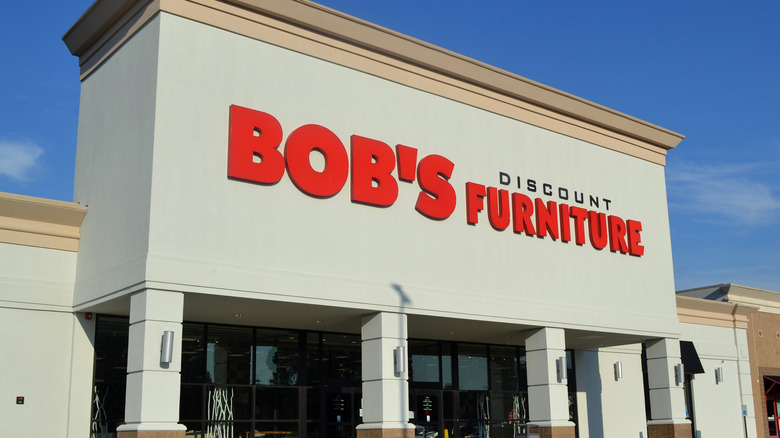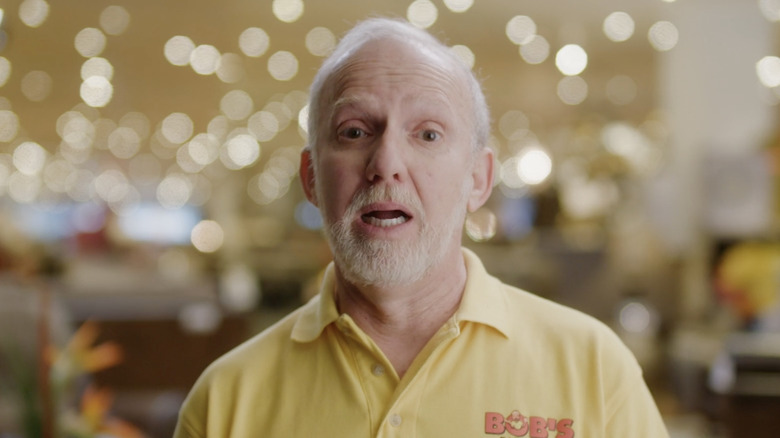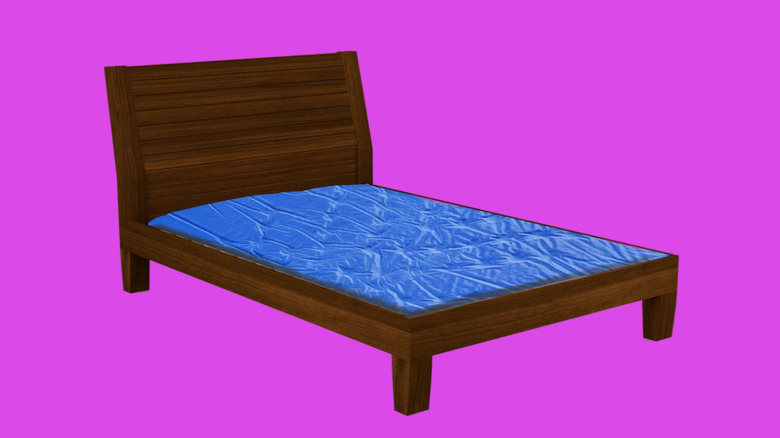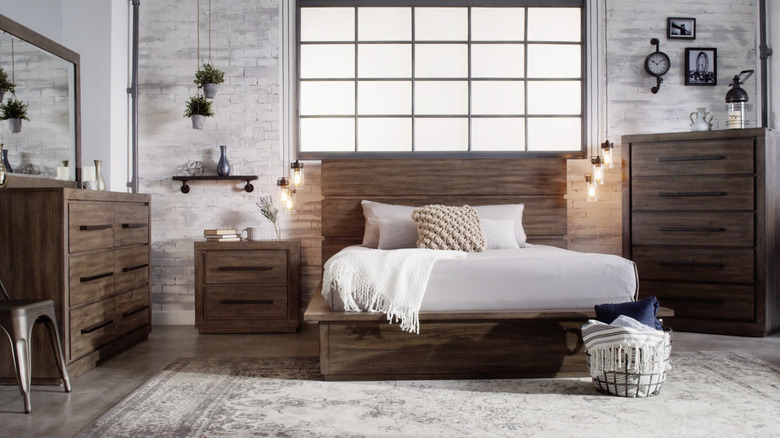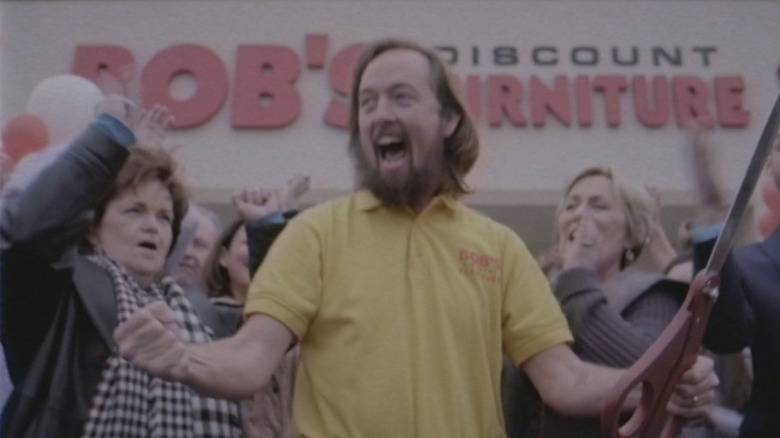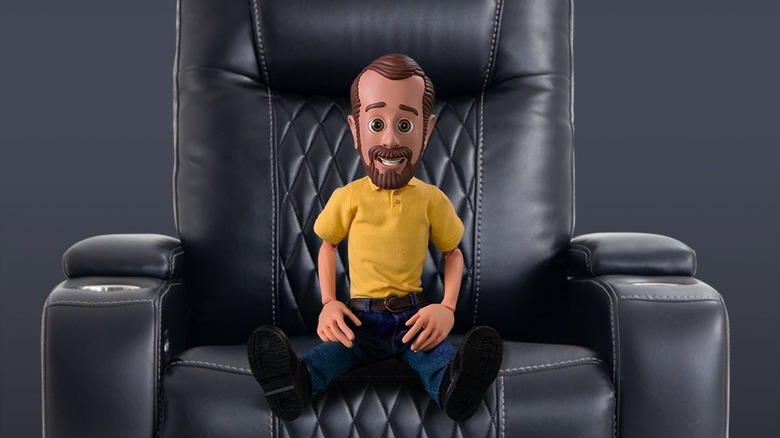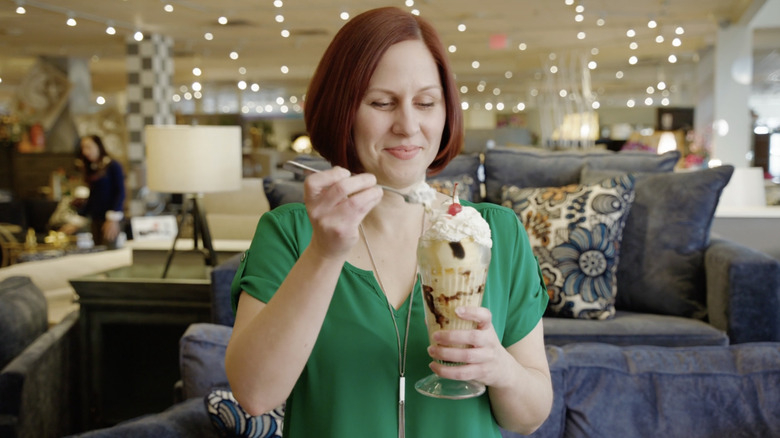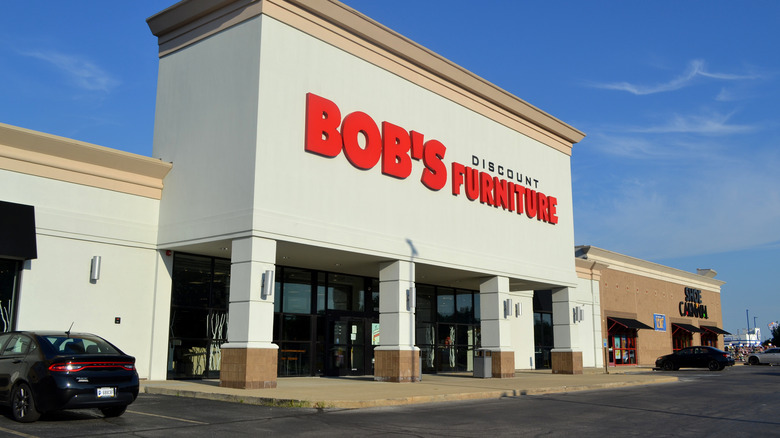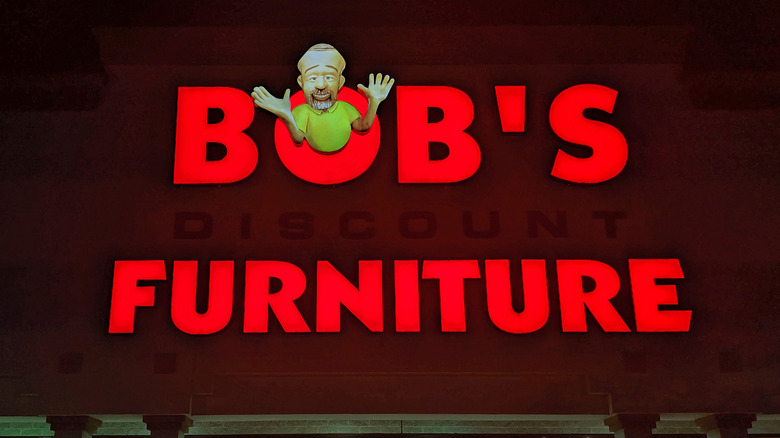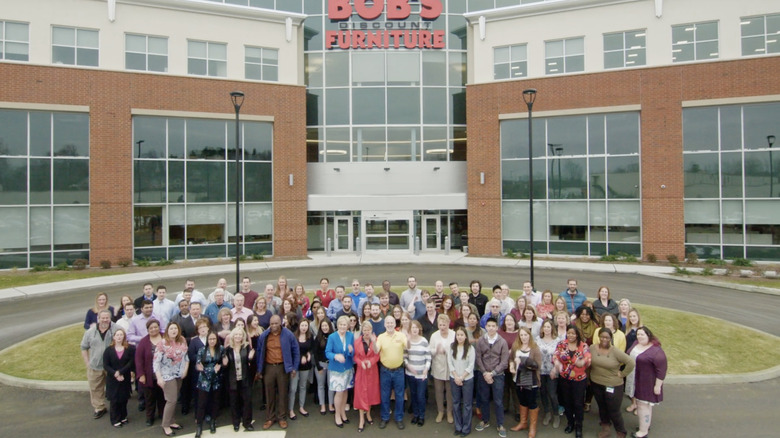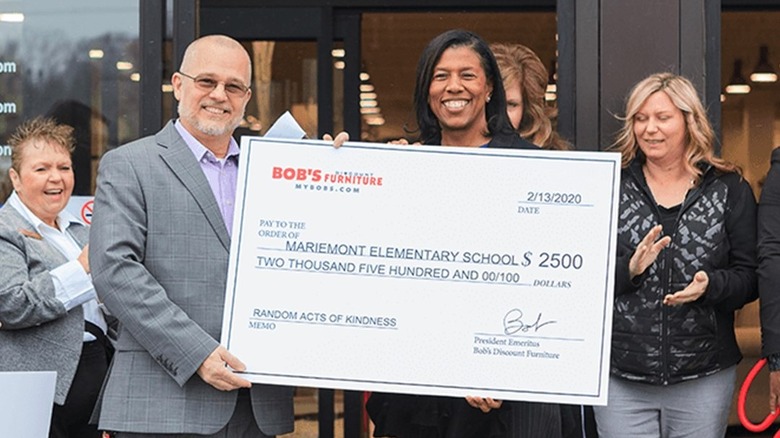Bob's Discount Furniture: 12 Facts About The Furniture Store
We may receive a commission on purchases made from links.
If you're in the market for some new furniture and want a shopping experience where you won't have a salesperson hovering over your every move, you may want to consider a trip to Bob's. Since 1991, Bob's Discount Furniture has positioned itself as the furniture retailer that skips sales pressure in favor of offering the lowest prices on a daily basis. They'll even throw in some ice cream and cookies — no purchase necessary.
The chain, which boasts over 130 stores, has become one of the most popular furniture stores in the United States, with annual revenue of over half a billion dollars. The success of Bob's Discount Furniture is due in large part to its namesake, Bob Kaufman, who, in some form or another, has appeared in all of the company's commercials. Love them or hate them, these commercials — along with a creative business plan that allows the company to sell sofas and mattresses cheaper than their competitors — have helped the chain expand from the Atlantic to the Pacific.
Whether you've got a house full of their furniture or you've never heard of the place, this is the history behind one of America's most popular furniture retailers: Bob's Discount Furniture.
The store's history can be traced back to a motorcycle crash
We're gonna go out on a limb here and say that Bob's is the only national furniture store that started because of a motorcycle crash. While the furniture company didn't officially begin selling sofas and dinner tables under the Bob's Discount Furniture flag until 1991, its earliest beginnings can be traced back to 1976, when co-founder Bob Kaufman (pictured above) wiped out on his motorcycle (via the University of Connecticut School of Business).
"I really f***** my leg," Kaufman recalled in a promotional video. "The doctor said I would never walk again." The injury was so bad that doctors contemplated amputating the leg, and Kaufman still walks with a limp because of paralysis.
Kaufman was a few years out of college at the time and working in a job that he didn't especially care for at Radio Shack. The motorcycle injury gave the future furniture king a new perspective on life and eventually propelled Kaufman into his chosen career. "Whenever you're faced with your mortality, it changes your outlook. Heck, I was 25 years old and felt immortal," Kaufman said. "It was a turning point. I developed a new mindset that said, 'Get serious. What are you going to do with your life?'" Not long after, he quit his job at Radio Shack for a new business venture.
Bob Kaufman jumped on the 1970s waterbed craze
Like a phonebook or Blockbuster Video, a waterbed is one of those concepts that's completely foreign to people of a certain age. Back in the dark ages of the 1970s and '80s, though, waterbeds were all the rage.
Bob Kaufman was advised to buy a waterbed to help with his physical recovery and couldn't help but feel he wasn't getting the best deal while shopping for one. "I kept thinking these stores were trying to pull a fast one on me," Kaufman said. "Why all the sales? Why all the shady pricing?"
Frustrated by his waterbed shopping experience, Kaufman entered into a partnership to sell the beds with his distant cousin, Gene Rosenberg, an experienced businessman. The plan was to lease a space in larger stores on the agreement that the lease would only be paid upon making a sale. This allowed Kaufman and Rosenberg to sell the waterbeds at lower rates than the competition. The business strategy proved to be incredibly successful, and the pair eventually leased 24 retail spaces in four different states. "I became the waterbed king," Kaufman told The New York Times in 1997.
The founders developed a strategy to keep prices low
By the late '80s and early '90s, the waterbed business had all but dried up. Bob Kaufman and Gene Rosenberg had to pivot, and the two men worked out a deal with one of the building owners where they had been leasing a space in Newington, Connecticut. The owner would cover utilities and taxes while Kaufman and Rosenberg would provide him with a percentage of sales. Just like with the waterbed lease agreement before, this new agreement helped give their business model a leg up. Kaufman said that this first Bob's Discount Furniture store filled a void in the industry where people could buy low-cost furniture without having to haggle. "We were the only low-cost furniture company," he explained in 2016.
Sales clerks avoided pestering potential customers, and, unlike most furniture stores at the time, there were no big markdown sales. "If you buy something today, it's the same price tomorrow," Kaufman told The New York Times. The company's website also says that they're able to offer such low prices by not offering brand-name labels and buying "more from the manufacturers than anyone else."
Yes, some of that furniture may be priced so low because it's been returned or has minor imperfections, but Kaufman is confident that they "have something for everyone," he told ReadingEagle.com.
The corny commercials have always been a trademark
If you have a Bob's Discount Furniture in your area, then you've almost certainly seen their commercials. Those ads, which can be pretty cheesy at times, have been the store's advertising bread and butter since the beginning.
The commercials almost always feature Bob Kaufman — or they used to, but more on that in a minute — often uttering "Forget about it" or "Come on down" to TV viewers. In the early days of Bob's, all production work on the commercials was done in-house, with Kaufman and two writers developing each concept. ”It's not complicated,” Kaufman told The New York Times in 1997. The furniture-salesman-turned-pitchman would simply pick out some furniture to highlight and turn on the camera.
As for the reception of those commercials ... well, when they run up to 500 times a week in a region, it's understandable that some people would grow tired of them. ”Some people love them, and some people hate them," Kaufman confessed. "One time, a guy came up to me, and I thought he was going to beat me up. 'I hate those ads,' he said, 'but I like you.'"
Kaufman's father advised him not to appear in the TV ads
If Bob Kaufman had listened to his father, then he wouldn't be the recognizable furniture king he is today. When Bob's Discount Furniture was toying with the idea of launching some TV commercials, Kaufman's dad, an advertising executive, advised his son not to appear in the ads. Besides telling his son that he had a voice "that sounds like chalk on chalk," the senior Kaufman said, "You look like crap." In customary child versus parent fashion, Kaufman said that he ignored his father's advice and "did [the commercials] anyway."
Passing on his father's advice and taking on the role as the official face of the furniture business proved to be a smart move. At one point, the business was shooting up to five TV spots a day, and Kaufman believes that, since that very first advert, they've produced somewhere between 5,000 and 6,000 commercials.
Little Bob is now the primary commercial mascot
A person can only appear in so many mattress and sofa commercials before things start to grow stale. Bob Kaufman is only human, after all. These days, the real Bob has mostly retired from appearing in the furniture store's ads, and he's turned those duties over to his mini puppet version.
As for why Kaufman stepped down, he likens the reason to two other founders of famous companies. "I am probably the only person in the history of marketing who lost my job to a puppet," he explained to Connecticut Magazine. "As a student of marketing, I look at Col. Sanders and Dave Thomas. Both did not plan adequately for when they were gone. I'm 69, and I don't want that to happen for my 6,000 employees and tens of thousands of their family members supported by Bob's income."
Obviously, customers noticed that the human Bob was gone, but they also took issue with the voice of mini Bob. "[It] still looks like him, but the voice is definitely being done by somebody else," said a curious Redditor. We did some digging and found out that the voice behind Little Bob is voice actor Al Pagano. Mystery solved!
Each store has a complimentary customer cafe
From its aversion to sales to its goofy commercials, Bob's Discount Furniture has made an effort to differentiate itself from competitors. Another way the chain has been successful in doing so is by appealing not just to the customer's wallet but to their sweet tooth as well.
Walk into any Bob's location in the country with hunger pangs, and they'll make sure you have something to snack on while shopping for a recliner. (Even if you're not really shopping, they'll still feed you.) Each store has a cafe stocked with candy, cookies, coffee, and ice cream. The whole idea behind the cafe, according to Bob Kaufman, is that shoppers can grab a snack while discussing any prospective purchases they may be scoping out.
"The decision to put a café in the store was easy," he explained. "I read that buying furniture is the third most stressful experience in life, only surpassed by buying a house and a car. I wondered how we could make people more comfortable." Plus, it doesn't hurt that ice cream is always a welcome distraction for kids during the boredom of furniture shopping.
The company spreads into new markets like wildfire
It's a pretty common belief in business that, if you're not growing, you're dying. Gene Rosenberg and Bob Kaufman took this to heart. Not long after opening the very first store, the businessmen began opening additional outlets in Connecticut. In just a few short years, Bob's Discount Furniture was dominating the discount furniture market. "We joke that if it was up to Gene, we'd have had 100 stores the first year," Kaufman told the University of Connecticut School of Business. "And if it was up to me, we'd still have two."
When the company expands into a new area, it often runs commercials months in advance and opens multiple locations in one fell swoop. Given this approach, it's not surprising that the furniture store's arrival is met with headlines like "Bob's Discount Furniture invades Chicago market." The company opened five stores in the Chicago area — all on the same day.
The chain isn't in every state, but it does stretch from Maine to California and as far south as Virginia. "Today, we have 139 stores. We opened four stores [in one week in January]," Kaufman said. "We have a total of 16 on the book for this year."
So, if there isn't a Bob's Discount Furniture near you yet, just be patient — one is likely in the works.
The founders no longer own Bob's Discount Furniture
Bob's Discount Furniture may want to think about adjusting the name to read "Formerly Bob's Discount Furniture" because Bob Kaufman is no longer a majority owner of the company. Kaufman, of course, still has a major stake in the company — he's a board member and president emeritus — but, like many successful chains, Bob's was bought out by a larger entity.
According to Furniture Today, Bob's had 19 stores in 2005 when 70% of the company was sold to a private equity firm. How much the firm paid for the discount furniture empire wasn't made public, but, considering that Bob's Discount Furniture did $250 million in sales the year before, it's safe to assume they paid a pretty penny.
Since then, Bob's Discount Furniture has changed hands again and is now owned by an investment firm, Bain Capital. (The furniture outlet is merely a drop in the bucket of Bain's $130 billion in assets.) Kaufman told Connecticut Magazine in 2021 that, while he's no longer doing any "day-to-day decision making" with the company, he's still "very much involved" with keeping Bob's name and image out there.
Bob Kaufman meets every new employee
How many jobs come with a celebrity meet and greet? Well, if you take a job at Bob's Discount Furniture, you're guaranteed a welcome from the man himself. Each location employs between 25 and 30 people, and Bob Kaufman makes it a point to meet each new member of the team in person, even if he doesn't remember all of their names. "I don't want anyone to say, 'I work at Bob's Discount Furniture, but I've never met Bob,'" Kaufman said, per the University of Connecticut School of Business. "We run it like a small, family business."
That's a lot of employees to meet, too. According to the company's Linkedin profile, it employs some 5,000 people. It also has a pretty respectable employee rating on both Glassdoor and Indeed. And, even if Kaufman is no longer calling the day-to-day shots at the company, he said in 2016 that providing a livelihood for so many people has been one of the most rewarding aspects of his career.
The company donates millions to charity
When Bob Kaufman and Gene Rosenberg sold a majority stake of Bob's Discount Furniture in 2005, one of the stipulations was that the equity firm would continue to donate a million dollars a year to charity. "It was a very important part of the deal," Kaufman said at the time, according to Furniture Today.
The company has been praised for its charitable efforts. It's something that Kaufman is incredibly proud of, and he credits his business partner for fostering that spirit. "Gene Rosenberg was certainly the 'guiding light' in directing our charitable dollars to areas that have the greatest impact, and I certainly learned at his side," Kaufman said in 2012.
The pair set up the Bob's Charitable Foundation in the early days of the business and hold various fundraising events throughout the year, such as golf tournaments that have been known to raise over $400,000. As for how that money is distributed, there's no shortage of requests for it. Kaufman explained that "the only downside is that you realize the tremendous need that's out there." The business receives up to 150 requests a week from various causes, and, in addition to donating to several children's charities and scholarship programs, the furniture company has been hosting a blood drive for over 15 years.
Bob's promotes women in leadership and diversity in the workplace
In addition to charitable contributions, Bob's Discount Furniture shows strong ethics internally. Newsweek named the company one of America's Greatest Workplaces for Diversity in 2023. In fact, Bob's diversity score landed at a whopping 4.5 stars. Human Resources Officer, Pat Davies, tells Bob's Blog, "We are so proud to be a company that serves a diverse range of communities and also hires, develops, and promotes people from all backgrounds."
The furniture giant's dedication to diversity shows, especially regarding women. "Redefining the Road," the official magazine of The Women In Trucking Association, named Bob's on its 2023 list of Top Companies for Women to Work For in Transportation. This is the retailer's second consecutive year on the list.
Bob's female leaders have also been honored individually in their specialized fields. Toni Spinelli, VP of Merchandise Planning, earned a 2023 Women in Supply Chain Award from Supply & Demand Chain Executive Magazine. The same year, EVP and Chief Merchandising Officer, Carol Glaser, was recognized as a top leader by Women in Retail. In conversation with the organization, Glaser shares that she has stepped up as an executive sponsor for the internal women's business resource group at Bob's. Through this role, she relays, "I want to help other women find their voice... I have four daughters and they're in the workforce. And yes, I'm a role model to them, but it's really important for me to have them see how I can impact other women — how they can come to my office and see more women in leadership roles. If I can help make that happen, wow."
